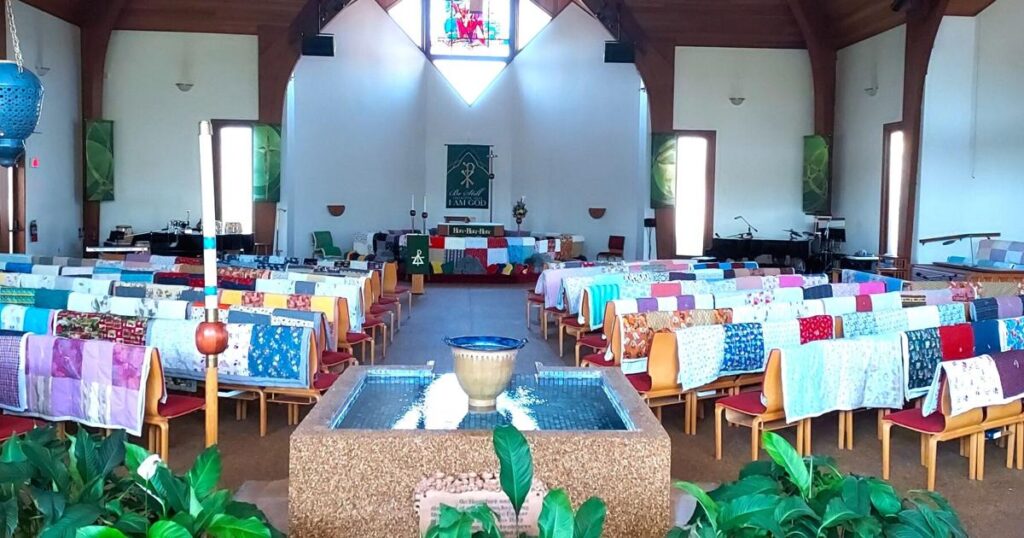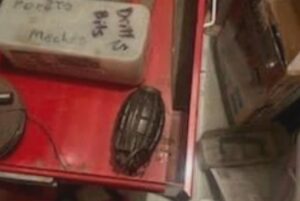

On a recent bike ride with friends, the subject of what we were each going to do the rest of the day arose. One friend groaned, “I’m either cleaning my linen closet or doing my taxes.”
“For sure the linen closet,” I said, offering my unsolicited opinion. “Not to guilt trip you, but children in Africa could really use your old sheets.”
I told her that I had recently gone to church on what happened to be Quilt Sunday. Draped over the back of every row of seats were quilts — 101 to be exact.
The church’s quilting circle had been busy. A woman from the group explained that these quilts, and thousands more like them from churches across America, were about to go throughout the world to areas recovering from natural disasters, to areas where war has driven families from their homes, and to areas where people need warm bedding, simple tents or floor coverings.
And they were largely made possible by enlightened people cleaning out their linen closets and donating old sheets, which quilters use to back the quilts, and pieces of fabric, which they use to make the quilt tops.
The woman showed a video about how in Tanzania, for example, many children suffer from a condition called stunting. They don’t develop as they should because temperatures get very low, and the children have little clothing. The calories from the food they do eat go to generate body heat, not to promote growth. So, their growth is stunted.
If this doesn’t make you want to run to your linen closet, you have a road apple for a heart.
Last year, Lutheran World Relief Quilting Mission, of which our church is part, sent 194,983 quilts worldwide, including 26,000 to Tanzania and 36,000 to Turkey and the Ukraine.
Reidun Canon, a retired pediatric nurse, has been part of the church’s quilting group for 10 years.
“This project makes me realize how blessed we are, and how much we take for granted, like warm housing and bed linens, when so many who live in poverty have neither,” she said. “Offering warmth and a blanket is such a simple act.”
So is cleaning out your linen closet and giving your gently used sheets and fabric remnants to the cause.
All this got me thinking about what else many of us have tucked away that could bring relief to others if we only knew where to donate them. So I did a little research. If you’re looking for a good reason to clean out your closets, consider these worthy causes.
• Gently used sheets. Box these up and call the Lutheran church nearest you. Ask if they have a quilting program affiliated with the Lutheran World Relief effort and how you can donate material. Sheets must be clean, not stained, and in good condition, Canon said. They can be plain or patterned and any size, from twin to king, flat or fitted.
• Cotton fabrics. Quilters also welcome colorful fabrics, which they use to make squares for quilt tops. “A lot of seamstresses have stashed boxes of fabric they thought they would use some day, but it never happened,” Canon said. Old curtains work well. Fabrics must be washable and in good condition. Cotton weave and cotton polyester blends are ideal. What won’t work are fleece, leather, terrycloth, velvet, wool or silk. “We also cannot accept any fabrics that have military, religious or patriotic symbols,” Canon said, “because we don’t know where in the world the quilts will end up.”
• Old towels. Closer to home, local animal rescues and shelters appreciate donations of used, clean towels to use for bedding and to dry animals after their baths, said Carey Kuhl, a moving concierge who helps people manage their belongings when they relocate.
• Stuffed animals. The same animal rescues also often welcome stuffed animals to tuck into crates to keep their four-legged charges company, Kuhl said.
• Kids’ clothes and toys. When a child comes into foster care, many foster parents run to their local Foster Closet, which are in almost every community nationwide, to get age-appropriate clothes and toys, said Mara Shorr, a former foster parent and volunteer child advocate. If you have clothing and toys in good condition to donate, find a Foster Closet near you.
• Luggage. Suitcases, duffels, backpacks or cosmetic travel bags can be a big help to foster kids, Shorr said. “Youths in foster care have to change homes often, and when they do, many end up putting their belongings in a garbage bag,” she said. “Your donated luggage can help them move with dignity.” See if your community has a CASA agency (for court appointed special advocate), or a guardian ad litem program, she said. Ask them to steer you toward a group home that houses foster kids that will accept donations of luggage, duffels and backpacks, which foster kids need for school. Please only donate bags in good shape, that have no rips, stains or broken zippers. If you have unused travel-sized toiletries from prior hotel stays, stick those in, too.
Now, go clean your closet, then do your taxes.
Marni Jameson is the author of seven books, including the newly released “Rightsize Today to Create Your Best Life Tomorrow: A Motivational Guide for Those Seeking Their Ideal Home Later in Life, and What to Do With Everything You Own to Leave the Legacy You Want.” Reach her at marnijameson.com.



